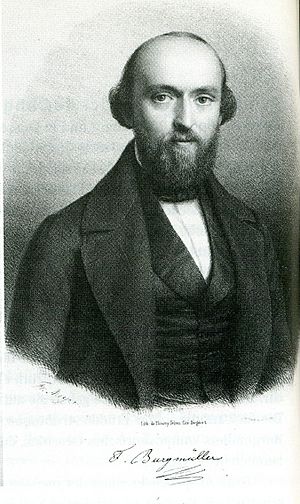Friedrich Burgmüller facts for kids
Johann Friedrich Franz Burgmüller, known as Friedrich Burgmüller, was a German pianist and composer. He lived from 1806 to 1874. He is most famous for his piano studies, also called "etudes." These are teaching pieces for students. His Op. 100 "25 Études faciles et progressives" (25 Easy and Progressive Studies) are very popular. They help students who are just starting to play the piano. He also wrote two other collections, Op. 105 and Op. 109, for more advanced students.
Contents
Life of Friedrich Burgmüller
Friedrich Burgmüller was born in a place called Ratisbon. At that time, it was part of the Principality of Regensburg. His father, Friedrich August Burgmüller, was also a composer. His younger brother, Norbert Burgmüller, was a composer too. His mother, Therese von Zandt, was a pianist and singer.
In 1829, Burgmüller moved to Kassel. There, he studied music with famous teachers like Ludwig Spohr and Moritz Hauptmann. He gave his first public piano concert on January 14, 1830.
In 1832, when he was 26, Burgmüller moved to Paris, France. He lived there for the rest of his life. His brother Norbert had planned to join him in Paris. But sadly, Norbert passed away in 1836. He drowned in a spa during an epileptic seizure.
In Paris, Burgmüller learned a new style of music. It was called Parisian music. He became known for his light and graceful playing style. He wrote many pieces of salon music for the piano. This was music meant to be played in people's homes. He also wrote his famous piano studies for children. Friedrich Burgmüller died in Paris on February 13, 1874.
Musical Works and Ballets
Burgmüller wrote many different kinds of piano pieces. These included waltzes, nocturnes, and polonaises. He also composed music for two ballets. One of his pieces, called Peasant Pas de Deux, was added to a famous ballet. This ballet was Giselle, created by Adolphe Adam. Burgmüller's music was first called Souvenirs de Ratisbonne.
Ballets Composed by Burgmüller
- La Péri
- Lady Harriet
Works with Opus Numbers
An "opus number" is a way to organize a composer's works. It usually means the order in which they were published.
- 6 Mélodies gracieuses de Bellini, Op. 26
- Souvenir de Bellini, Op. 27
- Souvenir de Schönbrunn, Op. 32
- La Cachucha, Op. 36
- Murmures du Rhone, Op. 66
- Corbeille de roses, Op. 68
- Fleurs mélodiques, Op. 82
- Fantaisie brillante sur "Ernani" de Verdi, Op. 92
- Blaue Äuglein, Op. 93
- Les Étincelles, Op. 97
- 25 Études faciles et progressives, Op. 100
- 12 Études, Op. 105
- 18 Études, Op. 109
Works Without Opus Numbers
These pieces were not given an opus number.
- L'Ange consolateur
- Ay Chiquita
- 3 Nocturnes, for cello and guitar
- Le Pardon de Ploërmel
- La Péri
- Souvenirs de Londres
- Ballade
See also
 In Spanish: Johann Friedrich Franz Burgmüller para niños
In Spanish: Johann Friedrich Franz Burgmüller para niños
 | Roy Wilkins |
 | John Lewis |
 | Linda Carol Brown |


